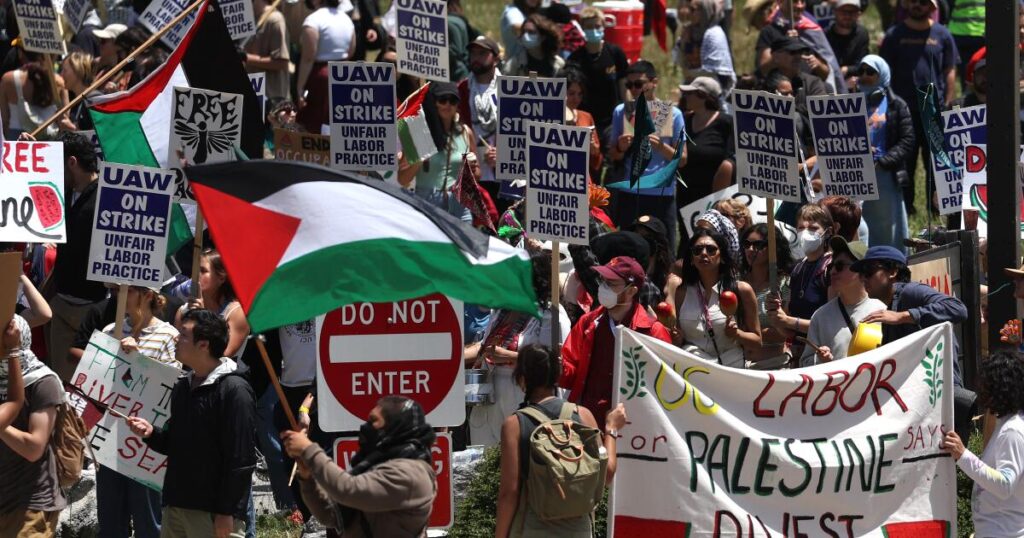Academic workers at UCLA and UC Davis are preparing to strike starting Tuesday, claiming the University of California’s actions during pro-Palestinian protests and encampment crackdowns violated their employees’ rights.
United Auto Workers Local 4811, which represents 48,000 graduate assistants, instructors, researchers and others at UC’s 10 campuses and Lawrence Berkeley National Laboratory, launched a rolling strike at UC Santa Cruz last week. The strike comes at a critical time in the school year, as classes are winding down and capstone projects, finals and grading are approaching, in which union members play a key role.
The planned expanded strike would be one of the largest actions by U.S. unions in support of the Palestinians and comes at a time when university leaders face scrutiny for calling in riot police to clear pro-Palestinian camps.
“I think unions do have the ability to raise this issue on the national stage and challenge the dominant discourse and the status quo,” said Gene McAdoo, a doctoral student in the UCLA School of Education and Information Studies.
UC officials charged that the strike was illegal. However, its emergency request to the state Labor Commission to immediately halt the strike was rejected by the commission, which ruled Thursday that UC’s allegations did not meet the legal standards for intervention.
Academic workers claim their free speech rights were violated when system leaders called on police to forcibly dismantle pro-Palestinian encampments on several campuses, while UCLA activists were shielded from counterprotesters for hours Attack on the camp. Police later dismantled the UCLA encampment and arrested about 200 people, including some members of the striking union.
UAW 4811 President Rafael Jaime witnessed the violence firsthand during the attack in late April. He praised the labor board for rejecting UC’s request for an injunction, saying it “demonstrates that no employer can make its own rules.”
The union leaders’ demands include protection of free speech on campus; amnesty for all academic employees, students, student groups, faculty and staff facing disciplinary action or arrest for participating in protests; university removal from “weapons manufacturers, military contractors and those from Gaza, Israel” Companies that profited from the war were divested.
University officials claimed the strike was illegal because the purpose was to “press the university to acknowledge a set of politically motivated demands that are closely tied to the protests taking place in California and across the country.”
The union filed the complaint with the state Labor Commission on May 10 involving the treatment, university discipline and arrests of union members at UCLA and other campuses, including UC San Diego and UC Irvine. The complaint accuses the university of retaliating against workers and illegally changing workplace policies to suppress pro-Palestinian speech.
UC also filed an unfair labor practice charge with the labor board, claiming the union’s decision to strike violated a no-strike clause in the collective bargaining agreement. Both charges are pending.
The strike comes amid ongoing unrest on the UCLA campus.
UCLA President Gene Bullock and two other university presidents testified Thursday before the Republican-led House Education and Workforce Committee, which is investigating anti-Semitism on campuses across the country. Bullock opened the panel by saying that “in hindsight,” the university should have “immediately dismantled” the encampment established by pro-Palestinian protesters in late April “if the safety of our community was guaranteed.” .
Bullock has also been questioned over complaints that Jewish students were blocked from access to parts of campus by pro-Palestinian protesters.
Later in the day, more than two dozen police officers in riot gear went to the Westwood campus and dismantled a small encampment set up by protesters.

